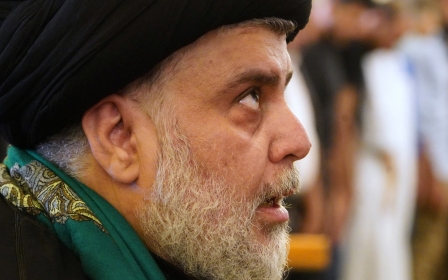Iraq tells Swedish ambassador in Baghdad to leave over Quran burning

Iraq has told Sweden's ambassador in Baghdad to leave Iraqi territory, after the Swedish embassy was stormed by hundreds of supporters of Iraqi Shia leader Muqtada al-Sadr at around 1am on Thursday.
Iraqi Prime Minister Mohammed Shia al-Sudani has also directed the foreign ministry to withdraw the Iraqi charge d'affairs from its embassy in the Swedish capital, Stockholm.
Bassim al-Awadi, an Iraqi government spokesman, said the Swedish ambassador was being asked to leave "in response to the repeated permission of the Swedish government to burn the Noble Quran, insult Islamic sanctities and burn the Iraqi flag".
The Iraqi Media and Communications Commission (CMC) has also suspended the business license of Ericsson, the Swedish telecommunications company, as the fallout continued.
Sadr's supporters called the demonstration on Thursday to protest a second planned burning of the Quran in Sweden, just weeks after Salwan Momika, a 37-year-old Iraqi man living in Sweden, burnt an Iraqi flag and desecrated the holy book outside the largest mosque in Stockholm.
Stay informed with MEE's newsletters
Sign up to get the latest alerts, insights and analysis, starting with Turkey Unpacked
Videos of the protesters in Baghdad show them spread out across the embassy's main building, standing on the roof, shouting and waving flags as it burns behind them.
Swedish Foreign Minister Tobias Billstrom said embassy staff were safe but that Iraqi authorities had failed in their responsibility to protect the embassy in accordance with the Vienna Convention, Reuters reported.
“What has happened is completely unacceptable and the government strongly condemns these attacks,” Billstrom said in a statement. “The government is in contact with high-level Iraqi representatives to express our dismay.”
Other reports noted the "minimal resistance from security forces" as the protesters stormed the embassy.
'Hostility to Islam'
Iraqi authorities arrested more than 20 demonstrators, including photojournalists from Reuters and the Associated Press. Security measures in Baghdad have been tightened as more protests are expected.
In a statement released on Thursday, Sadr said that Sweden had "declared its hostility to Islam and the divine books", as well as its "hostility to Iraq by giving approval to burn the flag of Iraq".
The influential cleric said that the Iraqi government should not be satisfied with merely condemning the burning of an Iraqi flag, "as this indicated weakness and submissiveness".
"I will await the firm official reply before taking any action of my own," Sadr said.
Iraq's foreign ministry condemned the storming of the embassy and said in a statement that the Iraqi government had instructed security forces to carry out a swift investigation, identify perpetrators and hold them to account.
Before the decision to tell Sweden's ambassador to leave was announced, Sudani's office told reporters that an emergency meeting of key officials had taken place on Thursday to address the "alarming matter of the Swedish government granting a permit to protesters for burning the Holy Quran, followed by the burning of the Swedish Embassy in Baghdad".
"The meeting strongly condemned burning the Swedish embassy in Baghdad, viewing it as a serious security breach requiring immediate action. Those accountable for security must be held responsible," the prime minister's office said in a statement.
"The Iraqi government has informed the Swedish government through diplomatic channels that any recurrence of the incident involving the burning of the Holy Quran on Swedish soil would necessitate severing diplomatic relations," Sudani's office said.
The Iranian-backed armed group Ashab al-Kahf, or Companions of the Cave, issued a statement saying they would "target all commercial and economic interests of Sweden in Iraq". Iran-aligned groups are seen as Sudani's biggest backers and his status as prime minister is closely connected to their support.
Sadr, one of Iraq's most powerful figures, commands hundreds of thousands of followers, whom he has at times called to the streets, including last summer when they occupied Baghdad's heavily fortified Green Zone and engaged in deadly clashes.
Finnish news agency STT reported that the Finnish embassy in Baghdad, which is in part of the same enclosure as the Swedish embassy, had also been evacuated but that staff were safe and unhurt.
Swedish news agency TT reported that two people were planning to burn the Quran and an Iraqi flag on Thursday outside the Iraqi embassy in Stockholm. A police permit had been granted and Momika was reportedly one of the two people expected to be demonstrating.
Swedish police denied several applications earlier this year for protests that were set to include burning the Quran, citing security concerns. Courts have since overturned the decisions, saying such acts are protected by the country's far-reaching freedom of speech laws.
According to Reuters, a series of videos posted to the Telegram group "One Baghdad" showed people gathering around the Swedish embassy at about 1 am local time on Thursday, chanting pro-Sadr slogans. They stormed the embassy complex around an hour later.
“Yes, yes to the Quran,” protesters chanted.
By dawn on Thursday, security forces had deployed inside the embassy and smoke rose from the building as firefighters extinguished stubborn embers, according to Reuters witnesses.
Late last month, Sadr called for protests against Sweden and the expulsion of the Swedish ambassador after the 28 June Quran burning in Stockholm.
After the burning, Momika was reported to the police for agitation against an ethnic or national group.
In a newspaper interview, he described himself as an Iraqi refugee seeking to ban the Quran, the central religious text of Islam, believed by Muslims to be a revelation from God.
Middle East Eye delivers independent and unrivalled coverage and analysis of the Middle East, North Africa and beyond. To learn more about republishing this content and the associated fees, please fill out this form. More about MEE can be found here.






